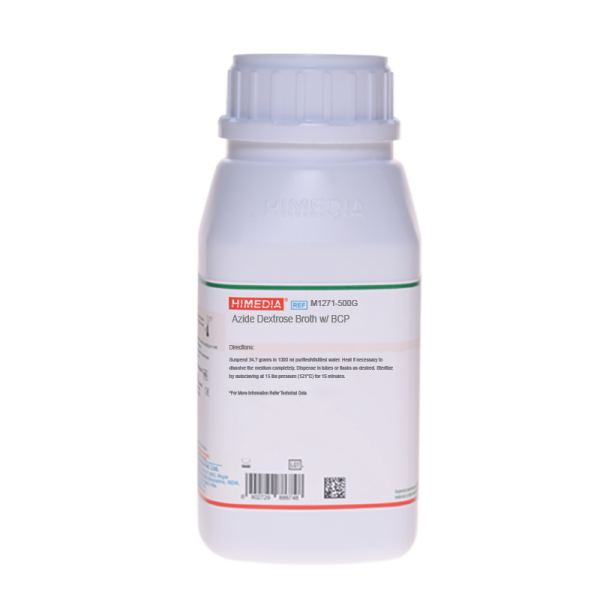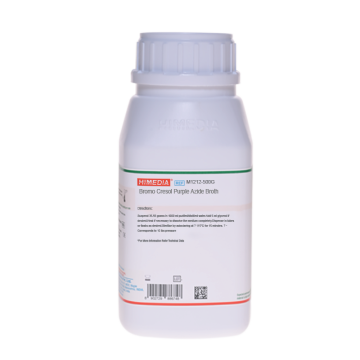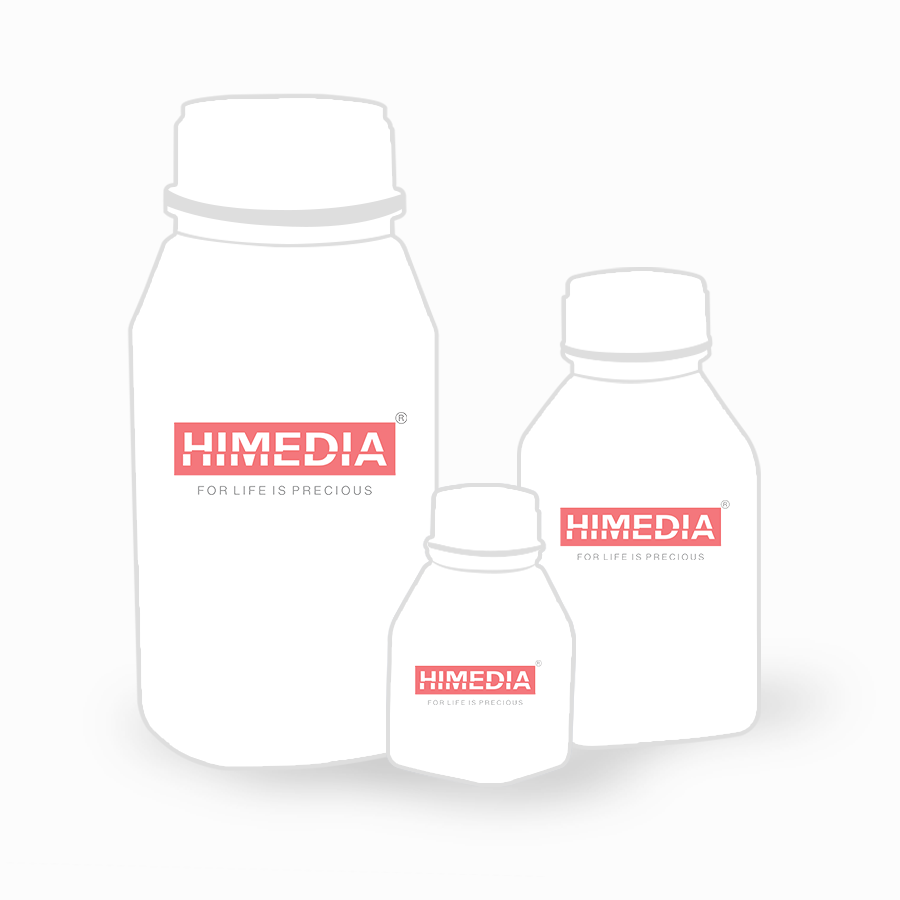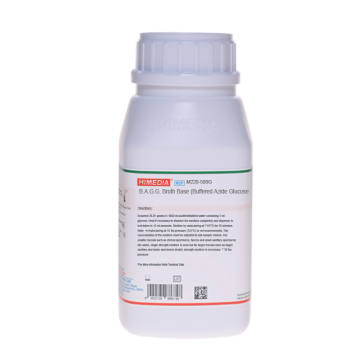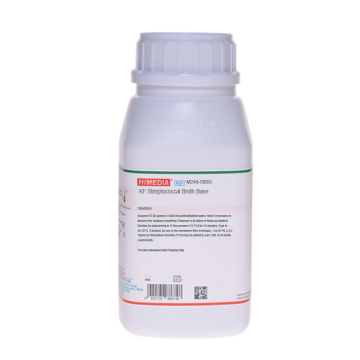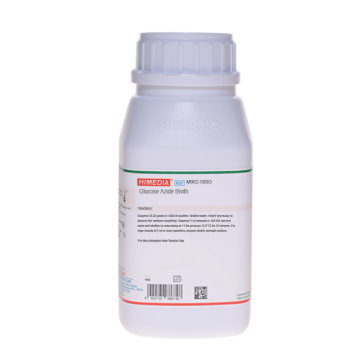 Your enquiry has been submitted
Your enquiry has been submitted
Azide Dextrose Broth w/ BCP
MPN Test#CC293D
Intended Use
Recommended for cultivation of faecal Streptococci.
Composition
| Ingredients | g/L |
|---|---|
| Tryptone | 15.000 |
| HM extract # | 4.500 |
| Dextrose (Glucose) | 7.500 |
| Sodium chloride | 7.500 |
| Sodium azide | 0.200 |
| Bromo cresol purple | 0.015 |
Final pH (at 25°C): 7.2±0.2
**Formula adjusted, standardized to suit performance parameters
# Equivalent to Meat extract
Directions
Suspend 34.7 grams in 1000 ml purified/distilled water. Heat if necessary to dissolve the medium completely. Dispense in tubes or flasks as desired. Sterilize by autoclaving at 15 lbs pressure (121°C) for 15 minutes.
Principle And Interpretation
Enterococci are more resistant to chlorine in water, hence are better indicators of sewage pollution than Escherichia coli. Until 1984, members of the genus Enterococcus were classified as Group D Streptococci. Upon genomic DNA analysis, a seperate genus status was provided to them. (1). Azide Dextrose Broth was initially formulated by Rothe, Mullmann and Seligmann (2,3) for quantitative determination of Enterococci in water, foods, sewage and other materials suspected of contamination with sewage. Azide Dextrose Broth w/ BCP is similar in composition to Azide Dextrose Broth with the addition of bromocresol purple. This medium is recommended by the ISO Committee for the detection and enumeration of faecal Streptococci in water as per ISO 7899-1:1984 (4).
It is a highly nutritious medium due to the presence of nutrient rich tryptone, HM extract and glucose. Sodium azide inhibits growth of gram-negative bacteria, allowing Enterococci to grow (2,5,6). Sodium chloride maintains the osmotic equilibrium of the medium. Bromo cresol purple is the pH indicator dye that changes to yellow colour under acidic conditions. Turbidity in tubes along with colour change to yellow indicate presence of Enterococci.
Type of specimen
Water samples
Specimen Collection and Handling
For water samples, follow appropriate techniques for sample collection, processing as per guidelines and local standards (7). After use, contaminated materials must be sterilized by autoclaving before discarding.
Warning and Precautions
Read the label before opening the container. Wear protective gloves/protective clothing/eye protection/ face protection. Follow good microbiological lab practices while handling specimens and culture. Standard precautions as per established guidelines should be followed while handling specimens. Safety guidelines may be referred in individual safety data sheets.
Limitations
- Further confirmation by biochemical and serological testing must be carried out on colonies from pure culture.
- Individual organisms differ in their growth requirement and may show variable growth patterns on the medium
- Each lot of the medium has been tested for the organisms specified on the COA. It is recommended to users to validate the medium for any specific microorganism other than mentioned in the COA based on the user's unique requirement.
Performance and Evaluation
Performance of the medium is expected when used as per the direction on the label within the expiry period when stored at recommended temperature.
Quality Control
Appearance: Cream to yellow coloured, may have slight green tinge homogeneous free flowing powder
Colour and Clarity of prepared medium: Purple coloured clear solution without any precipitate.
Reaction: Reaction of 3.47% w/v aqueous solution at 25°C. pH: 7.2±0.2
pH: 7.00-7.40
Cultural Response
Cultural characteristics observed after an incubation at 35-37°C for 18-48 hours.
| Organism | Inoculum (CFU) | Growth | Colour of medium |
|---|---|---|---|
| Escherichia coli ATCC 25922 (00013*) | >=104 | inhibited | purple |
| Enterococcus faecalis ATCC 29212 (00087*) | 50-100 | good-luxuriant | yellow |
Key: (*) Corresponding WDCM numbers.
Storage and Shelf Life
Store between 10-30°C in a tightly closed container and the prepared medium at 15-30°C. Use before expiry date on the label. On opening, product should be properly stored dry, after tightly capping the bottle in order to prevent lump formation due to the hygroscopic nature of the product. Improper storage of the product may lead to lump formation. Store in dry ventilated area protected from extremes of temperature and sources of ignition. Seal the container tightly after use. Product performance is best if used within stated expiry period.
Disposal
User must ensure safe disposal by autoclaving and/or incineration of used or unusable preparations of this product. Follow established laboratory procedures in disposing of infectious materials and material that comes into contact with sample must be decontaminated and disposed of in accordance with current laboratory techniques (8,9).
Reference
- Schleider K.H., Kilpper Bolz R., 1984, Int. J.Sys.Bacteriol., 34:31
- Mallmann and Seligmann, 1950, Am. J. Publ. Health, 40:286.2.
- Rothe, 1948, Illinois State Health Department.3.
- International Organization For Standardization (ISO), 1984, Draft ISO/DIS 7899
- Edwards S.J., 1933, J. Comp. Path. Therap., 46:2111.
- Hartman G., 1937, Milchw. Forsch, 18:166.
- Lipps WC, Braun-Howland EB, Baxter TE,eds. Standard methods for the Examination of Water and Wastewater, 24th ed. Washington DC:APHA Press; 2023.
- Isenberg, H.D. Clinical Microbiology Procedures Handbook 2nd Edition.
- Jorgensen, J.H., Pfaller, M.A., Carroll, K.C., Funke, G., Landry, M.L., Richter, S.S and Warnock., D.W. (2015) Manual of Clinical Microbiology, 11th Edition. Vol. 1.
| Product Name | Azide Dextrose Broth w/ BCP |
|---|---|
| SKU | M1271 |
| Product Type | Regular |
| Physical Form | Powder |
| Origin | Animal |
| Packaging type | HDPE |
| References | 1. Mallmann and Seligmann, 1950, Am. J. Publ. Health, 40:286.2. |



